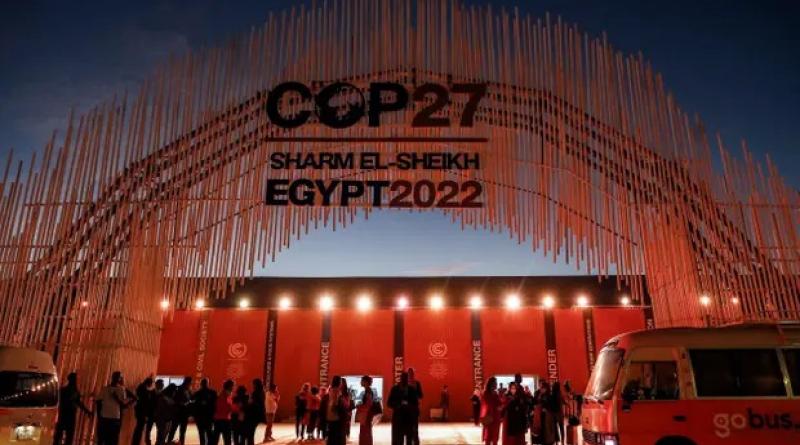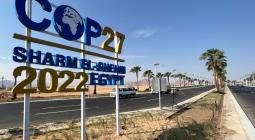‘Like Vegas, but worse’: Sharm el-Sheikh fails to charm Cop27 delegates

On first week of summit there have been traffic jams, water shortages – and an atmosphere of state repression
With its jarring mix of sun-drenched luxury resorts, overt authoritarianism, apocalyptic climate warnings and sub-Arctic air conditioning, Sharm el-Sheikh has so far proved a challenging and confounding venue for the Cop27 climate talks.
The Egyptian resort town, perched on the edge of the Sinai peninsula overlooking the Red Sea, has long been a draw for tourists and there are still groups of Italian and Russian holidaymakers relaxing to thumping Europop, in a place studded by gaudy hotels and attractions that include a fake Roman amphitheatre, large model dinosaurs and a replica pyramid. “It’s like being in Las Vegas, but somehow worse,” muttered one Swedish Cop delegate.
For Cop delegates, however, the experience has often been bewildering as they funnel into the cavernous venue, the Tonino Lamborghini International Convention Center, a place that has at various times lacked food, water, internet connection or a bearable temperature between the blazing sunshine outside and the frigid temperatures generated indoors by hulking air conditioning units that resemble plane engines.
For the first two days, more than 30,000 delegates at the climate summit had to get by on nuts or bread smuggled in from hotels, with kiosks only selling overpriced coffees or the odd ice-cream to long lines of people waiting in the heat. By the third day, however, the smell of cooked food finally wafting across the convention centre was met with near jubilation. “I just haven’t eaten much here, it’s been hard,” said Jean Su, an American climate activist.
There have been other oddities. There is a dearth of maps and signage at the venue, leading to long, confused treks in search of national pavilions, or a toilet. Organisers’ good intentions in promoting recycling and a fleet of electric buses to transport delegates has resulted in rubbish being piled into recycling bins and lengthy traffic jams.
More serious issues abound outside the venue. The authoritarian regime of Abdel Fatah al-Sisi has sought to quell any sort of dissent that may erupt at Cop beyond generalised climate protests, with a small army of police, security guards and state Mukhabarat agents found throughout Sharm. Delegates travelling by road have been treated to the strange sight of Mukhabarat operatives in suits, sunglasses and earpieces standing alone every 100 metres or so in the middle of the broad, dusty fields that fringe the venue.
Some activists have found this presence overbearing, with reports of surveillance, harassment and intense questioning of attendees to ascertain whether they are perceived troublemakers. Downloading the official Cop27 app, it turned out, required giving the Egyptian government access to users’ location and emails. Hotels, meanwhile, have hiked up their prices to astronomical levels, sometimes demanding more money from arriving delegates than was previously agreed.
Egyptians themselves have to deal with much worse and for far longer than a two-week conference, of course. Sanaa Seif, the sister of the jailed British-Egyptian hunger striker Alaa Abd el-Fattah, was a major focus of this security operation when she arrived at Cop27 on Tuesday to demand the release of her brother. Suspected plainclothes members of the Egyptian security services have tracked her movements and one pro-government MP, Amr Darwish, attempted to disrupt Seif’s press conference.
The atmosphere of barely concealed repression has hung over a conference that is, by its nature, a rather tortuous affair at the best of times. There was little optimism of a positive breakthrough by governments to act on the climate crisis beforehand and activists have again expressed frustration at the dawdling pace of progress by major polluters, particularly around the vexed issue of “loss and damage”, or payments from the wealthiest countries to developing nations that are bearing the brunt of heatwaves, drought, floods and other impacts. Loss and damage has been put on the agenda for the first time, in a win for developing countries.
There have been some notable rhetorical flourishes, not least from António Guterres, the UN secretary general, who has turned climate speeches into something of an art form. The world is on a “highway to climate hell with our foot still on the accelerator”, he warned. “Humanity has a choice: cooperate or perish.”
Some of the leaders on the frontline of climate disasters cut through the diplomatic niceties that have pervaded a three-decade long process that has struggled to confront the gravity of the problem it was set up to solve. “You might as well bomb us, that might well have been an easier fate,” Surangel Whipps, the president of the Pacific nation of Palau, told fellow leaders. “The climate crisis is tearing us apart limb by limb.”
Mia Mottley, the prime minister of Barbados, has emerged as a major star of these summits and was afforded a seat alongside Sisi and Guterres at the opening ceremony of a summit that drew more than 100 world leaders. Mottley acts as a sort of conscience to the wealthy countries that have yet to provide the climate funding promised to ease the pain of island nations like hers.
“We were the ones whose blood, sweat and tears financed the industrial revolution,” she said in a lacerating speech that invoked colonialism. “Are we now to face double jeopardy by having to pay the cost as a result of those greenhouse gases from the industrial revolution? That is fundamentally unfair.”
COVER PHOTO: Delegates arrive at the Cop27 climate conference in Sharm el-Sheikh. The Egyptian resort town has long been a draw for tourists. Photograph: Mohammed Abed/AFP/Getty





